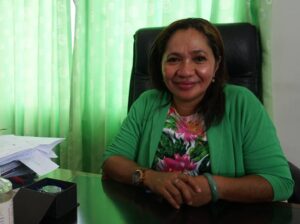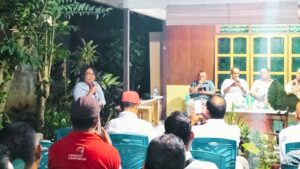The General Elections Commission (KPU) will face a wave of changes in provincial and district/city level election organizers in the midst of preparations for the 2024 election. To replace approximately 2750 members, the Indonesian Election Commission needs to conduct at least 12 recruitments during 2023-2024. The General Election commissioner of the Republic of Indonesia, Arief Budiman said the turn of the organizers in the middle stages of the election will increase the burden and disrupt stages of voting taking place simultaneously.
As the main person in charge of recruitment throughout Indonesia, the Indonesian Election Commission has the potential to be sued by many parties who are dissatisfied with the recruitment process. The Commission experienced many lawsuits during the 2019 elections in the midst of the 2019 simultaneous elections. “I had to go through a long trial because of the many lawsuits. Perhaps I was the only organizer of the election the most penalized, “said Arief. For this reason, the Election Commission proposes that the term of office of regional election organizers be extended until the 2024 General Election and Regional Head Elections are completed. Here are excerpts of an interview Jaring.id journalist, Debora Blandina Sinambela, with Arief on Friday, August 20, 2021.
Is it true that the Commission proposes an extension of the term of office of the election organizers?
Yes, it has been submitted to Commission II during a meeting with the government, Parliament, Supervisory Agency, and the Honorary Board of Election. However, it is necessary to emphasize that the extension of the term of office is only for administrators in provinces and districts/cities. The Indonesian Election Commission does not need to be extended because it was formed in April 2022, so there is still enough time for the Election Commission, which is just getting ready for the 2024 election.
What is the reason behind the extension of the term of office?
Many organizers end their term of office in the middle of the election stage. Most of the recruitment will be in 2023 and 2024, only a small percentage will be in 2025. During that stage, the Election Commission must carry out recruitment with a scattered schedule. Whenever our recruits have to do training, call them for task orientation. Though the stages of elections are underway in each region. This keeps them from focusing on running the stages.
Electoral Law regulates Indonesian Commission to running all over the stages and is given the responsibility of recruiting the provincial Election Commission and the regency/city. This model makes the burden of the central Election Commission very heavy because it must determine the organizers who are elected and the names on the list of reserves, the number can reach 5500 people.
People who are not selected are likely to be disappointed. They can complain to the honorary Board, supervisory agency, even to the court. Imagine how many trials would be if those included in the reserve list filed a lawsuit with the Indonesian Election Commission? This is what I had to experience during the 2019 election. I had to go through a long trial because of the many lawsuits. Perhaps I was the only organizer of the election the most penalized (In 2019, Arief has served as Chairman of the General Election Commission of the Republic of Indonesia). Imagine the whole process taking place in the middle of the simultaneous election stages. In my opinion, election organizers will not concentrate on going through the stages. The implication would be all sorts.
What are the benefits if the term of office is extended?
First, the organizers can concentrate on running the stages. Second, the budget is more efficient. Recruitment is not cheap because they have to pay for psychological tests, health checks, and interviews. The entire budget does not have to be charged to the election stage which already requires a lot of budget. Especially in the current pandemic situation, state finances are limited.
The Ministry of Home Affairs considers that organizers who have been subject to sanctions should not be extended. What do you think?
Sanctions have been issued in the form of permanent dismissal and warnings. This means that the sanctions have been implemented, so it should not be a problem. If, for example, those who are subject to sanctions cannot be extended, then how do you recruit them? Our replacement system replaces all members, not replaces some. When it comes to recruitment, we face that burden.
How should the organizer’s recruitment cycle be?
It should be in line with the election cycle. Once the election stages are complete, recruitment can begin so that organizers have sufficient time to face the next election. Not like now. I once inaugurated the Regency/City Elections Commission on polling day. They must carry out the collection without participating in the debriefing. In fact, the debriefing is very important because they are given an understanding of election principles, not only about election technicalities.
If the term of office of the organizer is extended, when will the Election Commission conduct recruitment?
When all stages of completion. In mid-2025 can be started or later than the recruitment of at least three years before the election of 2029. We will receive the organizers whose term of office simultaneously.
How about cut the term of office? Did the Election Commission offer that too?
The Election Commission has never proposed a shortening to 2022. That is the response from several parties, if it can be extended, what if it is shortened. But in my view, if it is shortened, when will it be shortened? The Indonesian Commission was only formed in April 2022. In the draft stages that we compiled, the commission proposed that the stages start in January 2022. If you recruit regional administrators in 2022, it means that you have entered the stage. If the recruitment starts earlier then it is exactly the same as the situation I described earlier, because you have to recruit simultaneously. Imagine that the recruitment that took place in two years was pulled all the way to 2022, it would be even harder.
If the Parliament and the Government reject the Election Commission proposal, does the Commission have another solution?
If the regulations are not changed, then there is no other way. The recruitment process will be as it is now.
What are your hopes and how has the Parliament responded so far?
I want a decision soon. This process must be fast, because if it is approved, the proposal cannot be implemented if the law is not revised. It will take more time to revise. In the last meeting the response was mixed. I see they think this is important to consider.







